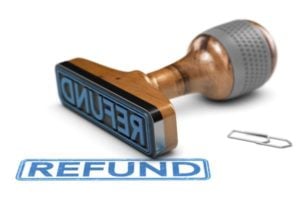
Applying your tax refund to next year’s estimated taxes might not sound exciting, but it could be a smart financial choice. Your first quarterly estimated tax payment is due April 15, and applying your tax refund to this payment could offer several benefits.
Avoid Spending Your Refund
It’s tempting to use your tax refund in a spending spree. You may have several thousand dollars and several ideas for how you’d like to spend it.
Alternatively, you may have other debts that you need to use your tax refund to pay off. It’s your choice as to how you use this money.
Applying your refund to your estimated taxes may be a good idea if you want to avoid giving yourself the chance to spend it recklessly. Instead, you’ll be getting a head start on next year’s tax liability.
Prevent Underpayment Penalties
If you don’t pay enough in estimated taxes, you could be charged underpayment penalties when you file your return. You can avoid underpayment penalties by meeting any of the following safe harbors:
- Your tax liability for the whole year is under $1,000.
- You pay at least 90 percent of your tax liability throughout the year in estimated taxes.
- You pay at least 100 percent of last year’s tax liability in estimated taxes.
The last safe harbor is the easiest to follow because you know with certainty how much you paid in taxes last year. You’ll only need to adjust this amount if you expect to earn less this year and don’t want to overpay.
Stay Ahead of Tax Problems
Not only do you want to avoid underpayment penalties, but you also want to avoid owing a large tax bill when you file next year’s return. Even if you miss just one of your four estimated tax payments, you could owe a large tax bill, plus penalties and interest.
You’ll also have to be worried about paying estimated taxes for the following year at the same time. This is how many tax debt problems start—you have current tax obligations to meet, but also past due taxes from last year to pay at the same time.
It’s up to you how to spend your tax refund. However, applying some or all of your tax refund to next year’s estimated taxes is a simple way to stay in tax compliance and avoid potential tax problems.
Get help with IRS tax debt problems by calling The Gartzman Law Firm at 770-939-7710. We can listen to your concerns and help you find the best tax resolution strategy for your case.

